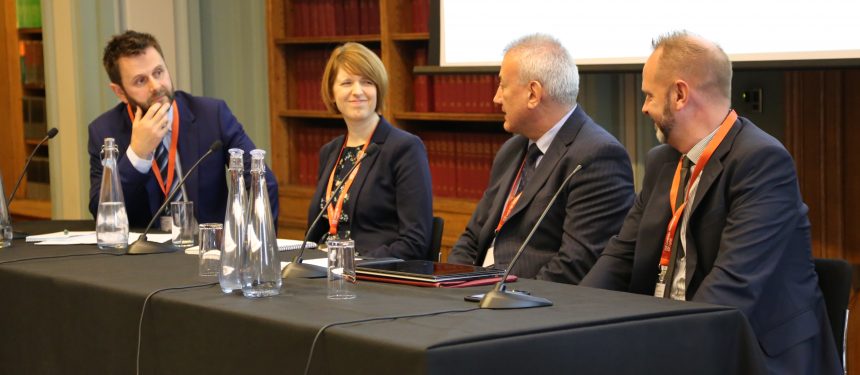Brexit is looming, but there is still much for the higher education sector to be positive about, such as a high prioritisation of research collaboration, according to a panel of industry experts who spoke last week at the Cambridge Assessment English international admissions seminar.
News and business analysis for Professionals in International Education
Have some pie!
Brexit ‘not all bad’ say int’l education experts
 The university panel discussion featured speakers from University of Edinburgh, Sussex and Bedfordshire. Photo: Cambridge Assessment English
The university panel discussion featured speakers from University of Edinburgh, Sussex and Bedfordshire. Photo: Cambridge Assessment English Representatives from Universities UK International, UCAS, British Council, QS and some of the UK’s leading HEIs shared the viewpoints on the topic of discussion: ‘Brexit – one year later’.
While most Europeans working in academia remember feeling shocked when the news of the ‘leave’ vote hit home, head of European engagement at UUKi, Anne May Janssen, was not one of them.
“I think we have taken our institutional partners too much for granted in the past”
“When the referendum happened most people didn’t expect [the outcome]. I must say I did,” Janssen told the 100 strong crowd of HE international recruitment professionals.
“There was a sense of mourning and disbelief in Brussels, but the way Theresa May spoke… the speeches she gave about the advantage of programs that promote science, education and culture, were actually quite encouraging.”
Janssen added that “signals are very positive” as both the UK government and EU are continuing to talk about the importance of collaboration and research.
While 2016 brought damning news for some HEIs – some lower-ranked institutions were said to be seeing significant declines in EU numbers – , UCAS, the UK’s university application service, experienced an all-time high in non-UK EU student applications.
“In 2016, applications were the highest they have ever been with 54,000 applicants, and 31,000 ended up accepting an offer,” said UCAS international marketing manager Mark Wilson.
However, Wilson put this down to an increase in university recruitment drives and he acknowledged small declines in monthly applications in 2017 from EU applicants.
While a full analysis of 2017 EU applicant numbers is not due to be published by UCAS until later this year, Wilson commented that initial findings show that some of the anxiety about Brexit has passed.
“Students still have access to loans and Brexit is going to be a long and drawn out process, so I think many are just getting on with their studies and the UK remains a choice for a decent number of EU students,” he said.
This was echoed by Paul Raybould, director of marketing and market intelligence at QS, who said that recent findings have shown attitudes to Brexit have “softened somewhat”.
He added that the weakened sterling has also made students from countries like China, Saudi Arabia, Hong Kong and India more likely to study in the UK.
“In 2016, non-UK EU student applications were the highest they have ever been with 54,000 applicants”
During the university panel discussion, Brexit was described by University of Edinburgh regional director for Europe, Helen McMillian, as a challenge but not an “insurmountable one”.
“The numbers for us for the time being are quite positive. We are not being complacent, but we’re not hitting any alarm bells yet either,” she said.
“However we are looking quite creatively at our postgraduate offering… we are looking at new emerging markets and we have incredibly ambitious objectives to increase our postgraduate taught students by 100 per year by 2019/2020.”
Brexit is also driving a more mature and creative approach to working with overseas partners, according to head of international office at University of Sussex, Martin Hookham.
“Our EU applications are up by a third this year and the reason is there has been an increase in senior members of staff going to various institutional partners on the continent. We will be sending more students too,” said Hookham.
“I think we have taken our institutional partners too much for granted in the past.”
Despite the sense of optimism, UK NARIC head of research and chair of the seminar Chris Lyons, said there are still many challenges ahead for the sector.
For UUKi, the major concerns are the increased barriers to recruitment of European staff and students and the loss the networks that come out of international collaboration.
“Regarding Erasmus, we know that students who started in September and have an obligatory year abroad in their third year at the moment don’t know if they can use Erasmus+,” confirmed Janssen.
Naquita Lewis, Erasmus+ lead at The British Council, said the program is of huge importance as mobile graduates are 32% less likely to be unemployed, compared with those with no international experience.
“So far we have not seen a decrease in interest in Erasmus+ since the referendum, in fact we are awarding more funding for mobility grants within Europe in 2017 than ever before,” Lewis said.
“It’s a big assumption to think that students who’ve previously taken up loans have alternative sources of funding”
UCAS findings have shown that funding remains a contentious issue for students. Wilson warned that 32,000 fewer EU students are likely to come to the UK if fees and funding change significantly.
“It’s a big assumption to think that students who’ve previously taken up loans have alternative sources of funding and wouldn’t be driven to substitute study destinations,” Wilson said.
The seminar concluded by highlighting that while it is easy to focus on the negatives that Brexit has uncovered, with change always comes opportunity.
“There is a lot of positive and creative ways that we can approach the coming years to make a success out of whatever happens,” Lyons added.
Still looking? Find by category:


